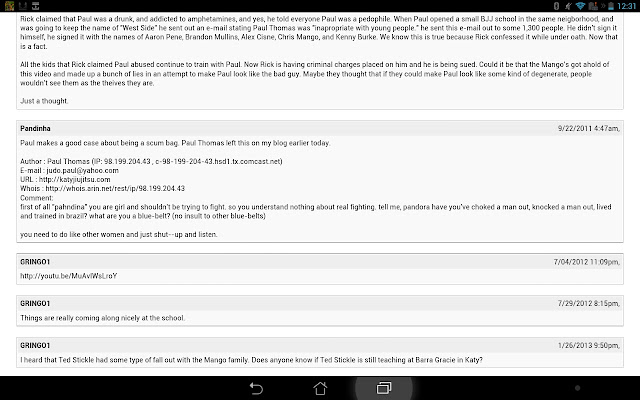***
Josh Hall wrote a really nice piece about the verdicts in the NYE rape cases on Undercard Superstar, and I guess it rattled Michael Dill's cage.
Michael Dill was one of the commentators who was screen-shotted and posted on my blog here. Here's the most relevant quotes from him-- one circled and one not.
This morning, I received the following by email.
Please understand, I posed a question, playing devils advocate and not knowing hardly any of the facts. This has been completely misconstrued and do not properly reflect my views on sexual assault, this particular case or my views toward the victim and assailants. Also nowhere has my post stating that I do not approve of any sexual assault appears in your blog. How is this fair to me and my name? I do not agree with miss use of my comment to propagate your agenda with someone or something else I am not apart of. I am formally asking you to remove it.
I responded by asking the person's name (as it wasn't apparent from their email address) and learned it was Michael Dill.
I replied:
If you feel your previous comments don't adequately express your views, please, write a correction and I'll happily post it.
But, I'm not taking down screen shots of what you already said in a public forum.
Thanks,
Georgette
And then he countered with this:
I am sorry this is your view. I do not wish to contribute to your blog nor am I longer friends with any of those who have posted on FaceBook. I will again strongly urge you to block out, make corrections or otherwise eliminate the use of my name on your blog regarding this subject. I am currently pursuing the advice of legal council to rectify any misuse of my comments regarding this subject and possible defamation of character as a result.
I have a few thoughts. First, lawyers are "counsel" not "council." It's "misuse" not "miss use." It's "a part of" not "apart of." Petty, I know, but goodness gracious, no one knows how to spell any more.
Second, let's talk about defamation.
Wikipedia says "Defamation" is the general term used internationally, and is used in this article where it is not necessary to distinguish between "slander" and "libel". Libel and slander both require publication.The fundamental distinction between libel and slander lies solely in the form in which the defamatory matter is published. If the offending material is published in some fleeting form, as by spoken words or sounds, sign language, gestures and the like, then this is slander. . . . Libel is defined as defamation by written or printed words, pictures, or in any form other than by spoken words or gestures. . . . There are several ways a person must go about proving that libel has taken place. For example, in the United States, the person must prove that the statement was false, caused harm, and was made without adequate research into the truthfulness of the statement.
I am sure Mr. Dill will be learning this shortly from some worthy practitioner in Houston. He's going to have a hard time proving that what I said was false (they were his statements after all.)
In Texas,
To prove a cause of action for defamation, a plaintiff must prove that (1) the defendant published a statement of fact, (2) the statement was defamatory, (3) the statement was false, (4) the defendant acted negligently in publishing the false and defamatory statement, and (5) the plaintiff suffered damages as a result. See Brown v. Swett & Crawford of Tex., Inc., 178 S.W.3d 373, 382 (Tex. App.-Houston [1 Dist.] 2005, no pet.) (citing WFAA-TV, Inc. v. McLemore, 978 S.W.2d 568, 571 (Tex. 1998)); see also Tex. Civ. Prac. & Rem. Code Ann. § 73.001 (Vernon 2005).
And then there are my statements about his opinions. Yes, I called them shameful, profoundly disturbing, and ignorant... but that's my opinion, and in Texas that's protected by the state and federal constitutions!
08-0610 MARK ZIMMER v. PALESTINE HERALD-PRESS CO., NEWSPAPER HOLDINGS, INC., AND SCOTT TYLER; from Cherokee County; 12th district (12-07-00139-CV, 257 SW3d 504, 06-25-08)(defamation, verifiable statement of fact vs. opinion)
An essential element of libel "is that the alleged defamatory statement be a statement of fact rather than opinion." [citation omitted]. Here, the meaning of the sign is somewhat ambiguous, but at most it accused appellants of "lawsuit abuse." To say that one has engaged in lawsuit abuse is to accuse him of legally manipulating the civil justice system to gain an unfair advantage in a personal or commercial dispute. It is an individual judgment that rests solely in the eye of the beholder. Admittedly, the accusation is derogatory and disparaging, but this is no different than saying that one is ugly, scurrilous, or disgusting. (6) The term "lawsuit abuse" does not, in its common usage, convey a verifiable fact, but is, by its nature, somewhat indefinite and ambiguous. Because it is a loose and figurative term employed as metaphor or hyperbole, it is an expression of opinion which is absolutely protected by the First Amendment of the United States Constitution and Section 8, article I, of the Texas Constitution. [citations omitted].
So thanks for reading folks... I'm going back to bed with a head cold.
























